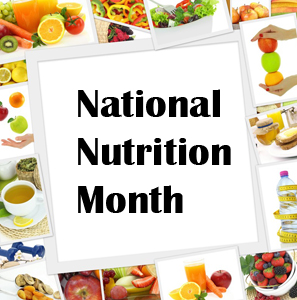March is National Nutrition Month and is a nutrition education and information campaign created annually in March by the Academy of Nutrition and Dietetics. Each year in the month of March, the Academy of Nutrition and Dietetics focuses nationwide attention on healthful eating, i.e. making informed food choices and developing good eating and physical activity habits. In 2018, the academy urges everyone to follow the theme “Go Further with Food.”
 In March 1973, a presidential proclamation created the first U.S. “National Nutrition Week” to help promote better eating habits. This weeklong informational campaign has become National Nutrition Month, with the strong support of the American Dietetic Association. This year the academy has put together all kinds of resources to help promote good nutrition. Good nutrition can be adopted by making smart food choices. This year’s theme “Go Further with Food” is focused on helping people create an eating pattern and physical activity plan that focuses on:
In March 1973, a presidential proclamation created the first U.S. “National Nutrition Week” to help promote better eating habits. This weeklong informational campaign has become National Nutrition Month, with the strong support of the American Dietetic Association. This year the academy has put together all kinds of resources to help promote good nutrition. Good nutrition can be adopted by making smart food choices. This year’s theme “Go Further with Food” is focused on helping people create an eating pattern and physical activity plan that focuses on:
- Consuming fewer calories
- Getting daily exercise
- Making informed food choices to reduce food wastage
By planning meals and snacks in advance you can also help reduce food wastage while saving both nutrients and money. A registered dietician nutritionist and Academy of Nutrition and Dietetics Spokesperson Cordialis Msora-Kasago, says that “While millions of Americans worry about how to feed their families, the amount of safe food wasted in the United States is on the rise. By making small changes to the way we think about eating, we can help reduce food waste.” The foods you choose can make a real difference in your overall physical and mental condition. By adopting these goals, people can manage their weight successfully and reduce their risk of chronic disease while promoting general health.
Good nutrition is one of the keys to a healthy life. You can improve your health by maintaining a balanced diet that contains all types of nutrients, vitamins and minerals. This includes fruits, vegetables, whole grains, dairy, and a source of protein. For smart food choices you have to keep in mind a few things. They are:
- Breakfast is the first meal of the day, so don’t skip your breakfast. In fact studies reveal that people who skip their breakfast tend to overeat throughout the day.
- Eat fresh foods such as fruits and vegetables on a regular basis. Fruits and vegetables are low in calories and nutrient dense, which means they are packed with vitamins, minerals, antioxidants, and fiber.
- Make healthy choices for snacking and try to make it smaller portions. Instead of unhealthy snacks such as crisps, granola bars, cereal bars and crackers that contain a lot of empty calories try using yogurt, nuts or fruits as snacks. These are healthy and contain lesser calories, keeping you from approaching the next meal over-hungry.
- To avoid food wastage, look for the foods you have on hand before buying more at the store. Make sure you buy only the amount that can be eaten or frozen within a few days.
- Be alert of the portion sizes that you eat.
- Drinking water regularly and hydrating throughout the day helps to flush out all the toxins from your body, and can also help mitigate illnesses such as kidney stones and constipation among others.
Two very basic and important steps toward a healthier diet are eating more fruits and vegetables, and controlling your portion sizes. This nutrition month let us join hands to combat misinformation and adopt healthy eating habits, which in turn will lead to a happier, healthy life for everyone.